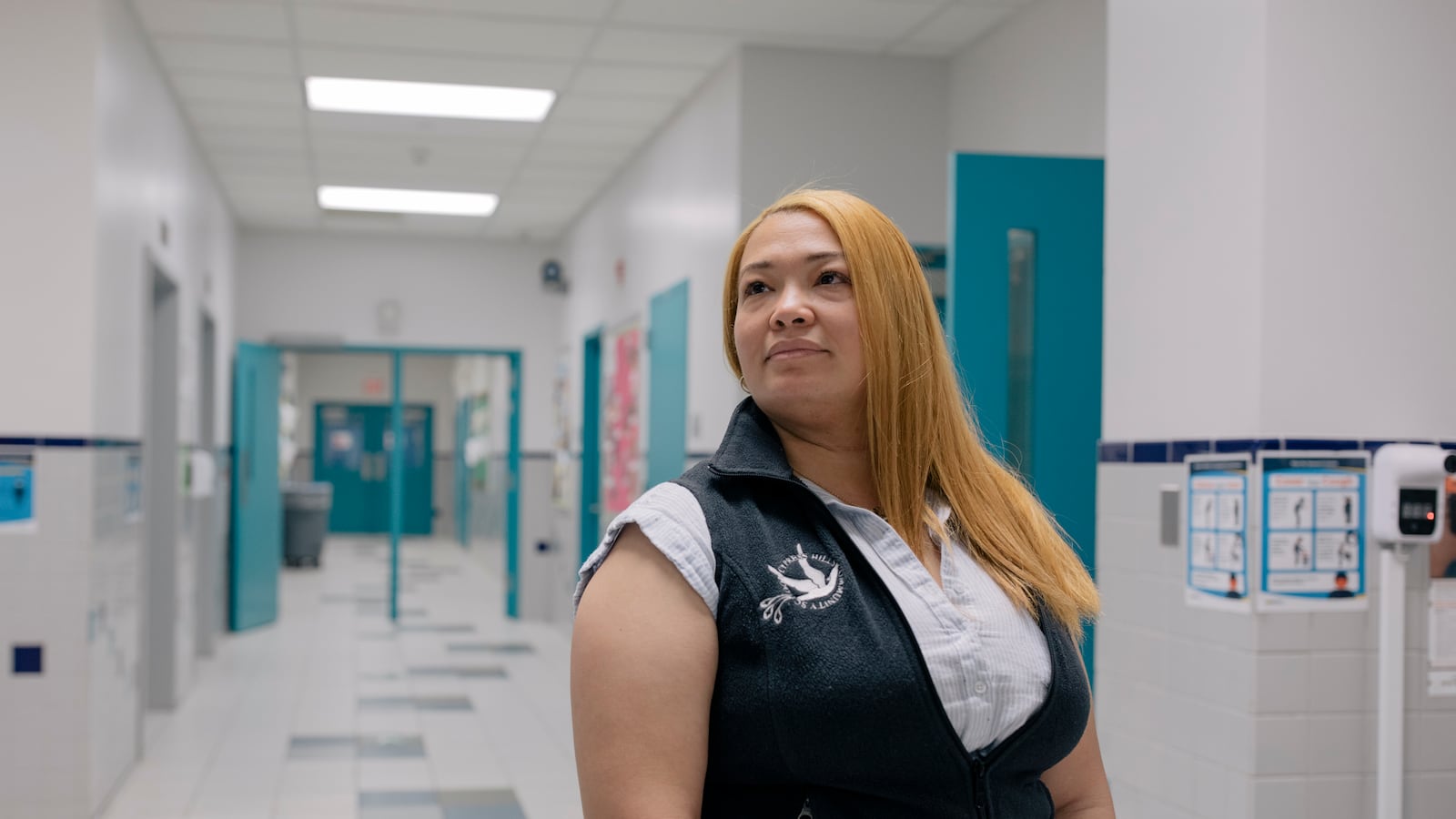The messages pinged at all hours, pleas from parents frantically trying to keep up with remote learning as the coronavirus pandemic took hold of New York City.
A password for Zoom lessons. The third grade class schedule. Trouble logging into an email account.
Each one was urgent. Some were dire.
Unpaid utility bills. No food in the house. Reaching a breaking point with a child.
The texts flooded “PS 89 PTC 2019-2020,” a group chat started by the Parent Teacher Collaborative on WhatsApp. It became a lifeline last spring for the families of P.S. 89 in Cypress Hills, a small Brooklyn neighborhood bordering Queens that has been among the city’s hardest hit communities. One out of every 10 people in the school’s 11207 ZIP code was infected with the coronavirus. More than 300 died.
As COVID upended school, the thread on the messaging app was a virtual gathering place to share reminders of login times and tips for navigating Google Classroom. As families lost jobs, the chat was a bridge to help signing up for food benefits or receiving care packages full of hard-to-get essentials like sanitizing wipes and toilet paper. And as nerves frayed and losses mounted, the message group served as a direct line to a listening ear.
It was often an all-hands effort, with parents, teachers, and school leaders jumping in with answers whenever they had them. But sorting through the deluge of need often fell to a team of moms on the P.S. 89 parent organization. While staring down the crisis themselves, they responded to message, after message, after message — helping make sure families were fed, received remote learning tech support, and had someone to turn to even while isolated at home.
Help was a WhatsApp message away
Many parents did not yet have devices, internet, or even email accounts before schools abruptly pivoted online. But almost everyone had a cell phone with WhatsApp loaded. The app was popular among the many immigrants who make up the core of families served at P.S. 89, an English and Spanish dual language school serving grades 3-K through 8. With 150 parents and school staffers on the thread, it became the virtual town square for a tight-knit school that has long prided itself on its strong relationships with families.
“It became a place where, also, parents vented about whether there were problems, how they were feeling” Ceucynth Cordero Ochoa said. “It was a place where they had someone to talk to.”
Cordero started the chat thread not long before the pandemic hit. She has been the devoted president of the school’s parent organization for the last two years. Her three children have all attended P.S. 89, ever since her eldest, now in seventh grade, started kindergarten.
Cordero thought a WhatsApp group would be a more effective way to get the attention of parents, since flyers in backpacks often get missed. It’s also accessible to families even if their phones get cut off, since parents can still use WhatsApp by connecting to free WiFi signals at places like McDonald’s. She texted reminders about crazy hat day, or the next family night, when the school would open its doors for a communal meal, or a lesson on how to make sense of their children’s math homework.
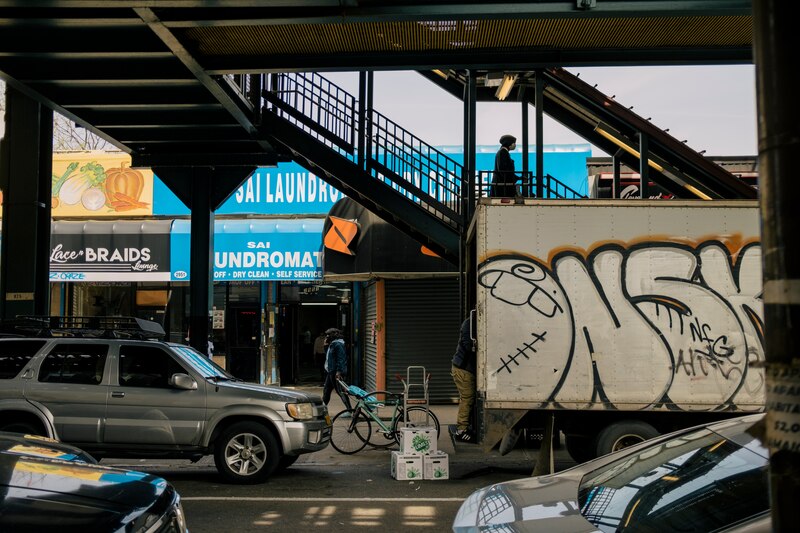
Bringing parents in has always been core to P.S. 89’s mission: Families who were dissatisfied with nearby options helped found the school in 1997. They created a “community school,” the only one in the city’s public school system where a parent co-director serves alongside the principal. The school partners with the nonprofit Cypress Hills Local Development Corporation to help families solve problems that go beyond academics, but can still affect how much kids learn. The model preceded the education department’s own community school program, offering on-site wraparound services and referrals for mental health counseling and other social services.
The school’s community focus along with its Spanish program drew Cordero to P.S. 89 not long after she and her family arrived from Puerto Rico, where they lived for a few years after leaving their home country of the Dominican Republic.
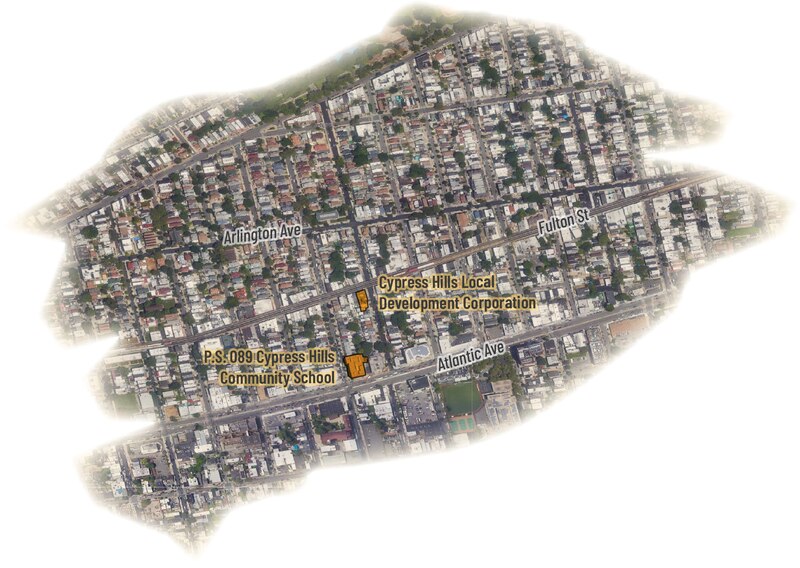
On March 16, 2020, with seven coronavirus deaths tallied in New York City, the nation’s largest school system shuttered all its buildings. Then-chancellor Richard Carranza had assured New Yorkers all week that schools would only close as a last resort. “We’re at the last resort,” he said on a Sunday afternoon, announcing the shutdown would be effective the next day.
Cordero doesn’t remember exactly how she found out schools would be closing — whether she heard it on the news or received an email from the school. But from that moment on, the WhatsApp thread ignited.
“The chat became the center of everything. It really did,” she said. “That chat was the heart.”
Parents sent photos of birthdays celebrated in lockdown. They shared videos of students playing the recorder for a virtual talent show. They posted pictures of stacks of books the education department sent to families who were still waiting for devices to arrive, materials that teachers hoped would keep kids learning. The parent coordinator wrote a congratulatory message that, despite everything, attendance had managed to stay strong at 98%.
It was also a place to get connected with much-needed help.
“Hellooo if someone needs food/the church next to the school is giving some away/today,” one parent wrote in Spanish.
“I went they’re giving bananas coffee apples carrots lemons cereal Gatorade,” another answered.
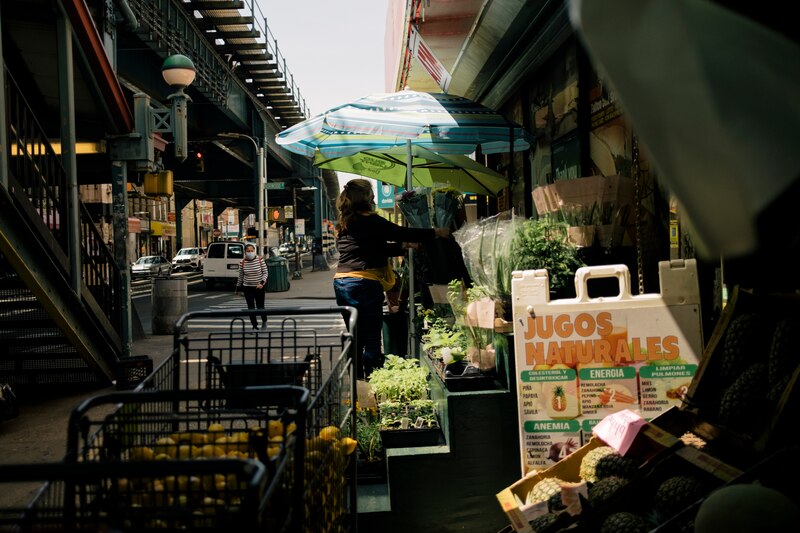
And there were questions — so many questions — about navigating remote learning.
“For those who have received learning devices, did UPS or FEDex deliver it?” one parent asked, worried about the iPad getting swiped if it got delivered while no one was home. “If any of you had problems with the internet connection on the [education department] iPads, let me know, I had that problem and I was able to solve it,” another wrote, letting parents know they needed to download a software update to be able to get online.
Cordero typed out all the responses she could, while also trying to problem solve the same issues in her own home. Her family had one laptop. It went to her son, the eldest, who took up the living room as his new classroom. The younger children logged into lessons from a cell phone and a tablet, sitting side by side at the kitchen table. Cordero hunted for headphones for the two, who struggled to hear their teachers over each other’s classes.
All the while, the chat group pinged with parents in need. In the scramble of those first few days and weeks, the most pressing issues revolved around the logistics of online school and tech support for a community that had been largely analog before the pandemic struck. As soon as she figured out how to log into Google classroom or download a new update on the education department-issued iPads herself, Cordero would jump on conference calls with other parents who texted the group chat for help figuring out the same problems.
As they settled in — Cordero tracked down headphones, and an iPad finally arrived from the education department — it was clear this would be a long haul. She had to buy a new cell phone after her battery gave out from using it so much. She left her job managing hotel reservations online so she could attend to her children and her PTC duties.
With the school’s dedicated tech support specialist overwhelmed, Cordero stepped in to help. Families didn’t understand program instructions that would pop on screen in English, or know how to open a downloaded document, or find a password buried in an email somewhere.
Not long after schools closed, a family reached out on the chat needing tech help. Cordero soon appeared on a video chat with them, helping navigate a maze of drop down menus, apps, and links. Some time went by, and her phone pinged with a new text from that same family. No one in the house had been working, the mom wrote to Cordero, and unpaid bills had stacked up. They worried their lights would be turned off, and with it, a steady connection to online school.
From remote learning to hunger: ‘We would solve the problem.’
This problem would become more common. While the pandemic raged, the unemployment rate in Cypress Hills rose from 5% in February 2020 to 25% that June, one analysis found.
When they learned about these cases, the PTC did what they could. They tapped their modest fundraising account. Instead of trips to the Brooklyn Botanic Garden to see cherry blossoms, as the parents had arranged in years past, the PTC paid for pantry staples like rice, and helped put together care packages full of disinfecting wipes and over-the-counter pain relievers.
The most pressing cases, the ones that couldn’t be solved with a bundle of groceries, got funneled through WhatsApp messages to Cordero and other PTC moms, who handed them off to the school’s administration and to Cypress Hills. That’s when the community schools model would kick in, with a network of school and Cypress Hill staff connecting families to food benefits, unemployment checks, or a phone call with a social worker or counselor.
“It’s like a chain. They would talk to me, I would talk to the school, with Cypress,” Cordero said. “And that’s how we’d go down the path until we would solve the problem.”
“Somos una gran familia.” We are a big family, she said.
Often, the person who Cordero passed families to was Amalfi Richard, the school’s parent coordinator. As the pandemic raged, and families hunkered down, too fearful to leave their homes, Richard masked up and headed to a fruit and vegetable stand near the school and the local pharmacy. She did the shopping for the care packages that families received — paying out of her pocket, until the PTC set up an online fundraising account — and dropping off items at front doors.
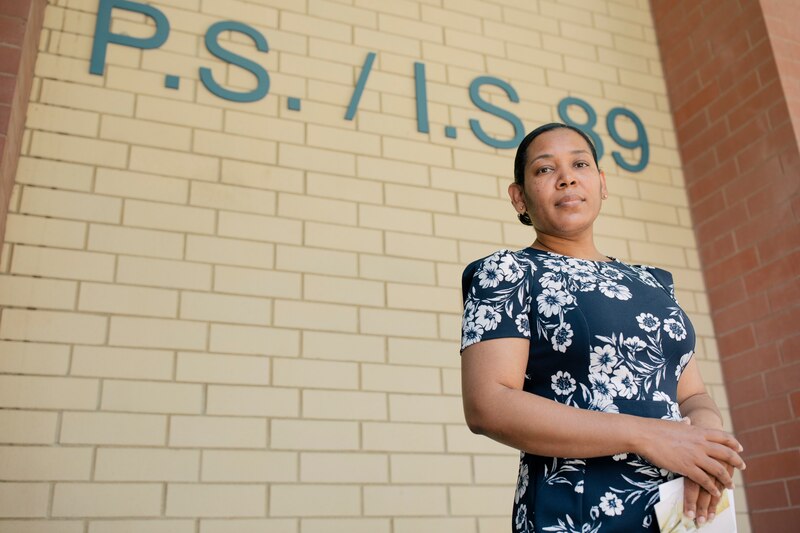
Richard remembers picking up laundry detergent and cleaning supplies for a single mom who had come down with COVID and shared a bathroom with five other family members. Richard was also an active member of the chat group, posting photos of a caravan of cars visiting graduating eighth graders or information about where parents could pick up free masks.
“I need to have direct communication, so WhatsApp helped me a lot,” Richard said. “It worked really well for the emergencies, especially when the schools were closed, because now that the school was closed, what number do you call?”
No matter how much the school and PTC moms managed to help, it seemed like the chat group kept pinging with more work to be done. At one point, the PTC divvied up responding to the messages by grade. They would post screenshots of class schedules and translate into both Spanish and English. The PTC moms handed out their personal numbers, and soon the chat messages turned into phone calls.
Caring for parents’ mental health
The calls that stick most with Carmen McKay, the PTC secretary, were the ones from parents who felt crushed by the isolation and stress of lockdown. Parents, often mothers, suddenly found themselves playing the role of full-time teacher, cook, and caregiver — while sickness and deaths mounted around them.
“I had this mother who called me and said, ‘Listen I’m going to go crazy and I don’t know what I’m going to do with my child,’” McKay remembered. “You would talk to the child and she would say, ‘My mom is so angry. Everything bothers her, and I don’t know what to do.’”
She spent hours listening to parents at their worst moments, telling them to take deep breaths, and sometimes even serving as a mediator.
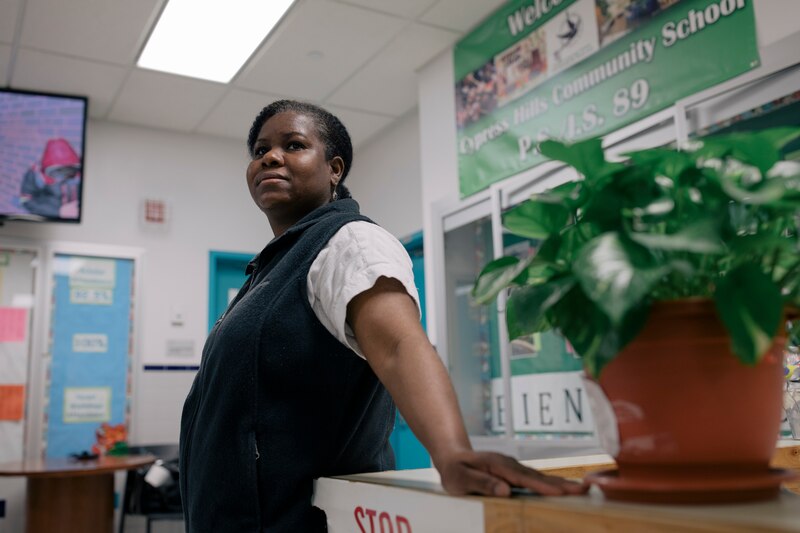
“Just thinking about it, going to that space, it’s really overwhelming,” McKay remembered. Even still, she’s glad parents “trusted us enough to pick up the phone.”
“It’s good to see that little conversation you have with the parent helps them calm down,” McKay said. “Because we know that’s not us. It’s all that stress.”
All that time she was listening to other parents, she didn’t share much about her own challenges. McKay, who worked part-time watching two children, was living with her daughter in her employer’s home, to avoid exposure to the virus traveling to and from the job. Her husband remained in their Canarsie apartment. While both were able to continue working, they spent two months apart. McKay found her own ways to cope.
“I did a lot of yoga. I did a lot of reading. I do a lot of praying, especially when it comes to listening to parents who were very frustrated with their children because that was hard,” she said.
As school returns in-person, the chat continues
This school year has been tumultuous, and the WhatsApp chat is still going strong. In the fall, after two delayed starts pushed building reopenings back by nearly a month, it was the place where families could be reminded of which days each cohort would be in school. New York City schools had a complicated return, with most children learning exclusively from home while social distancing meant that in-person children followed sometimes confusing hybrid schedules, learning in school on some days, and remotely on others. Under half of the school’s 460 students returned to the building this year. When positive coronavirus cases forced the building to close — which happened so often that the school shuttered about every two weeks, according to the principal — the notice would be posted in WhatsApp.
As relaxed social distancing rules have allowed the school’s in-person elementary school children to return five days a week, and an increasing vaccination rate has driven COVID rates to the lowest levels yet in the city, the chat group has become less about triage and more of a place to learn about parent workshops on everything from healthy food to managing stress.
Richard, the parent coordinator, uses WhatsApp these days to remind parents of their regular cooking classes. Before the pandemic, parents would make meals together in the school kitchen. Now, Richard posts the recipes in the chat, and parents come to school to pick up a bag of fresh ingredients. They all cook together on Fridays over a video call. Afterwards, parents post pictures of the dishes they’ve made.
“It’s not just about the pandemic, the pandemic, the pandemic,” Richard said. “It’s wellness and taking care of your feelings. It’s also like highlighting the family, the feeling of unity.”
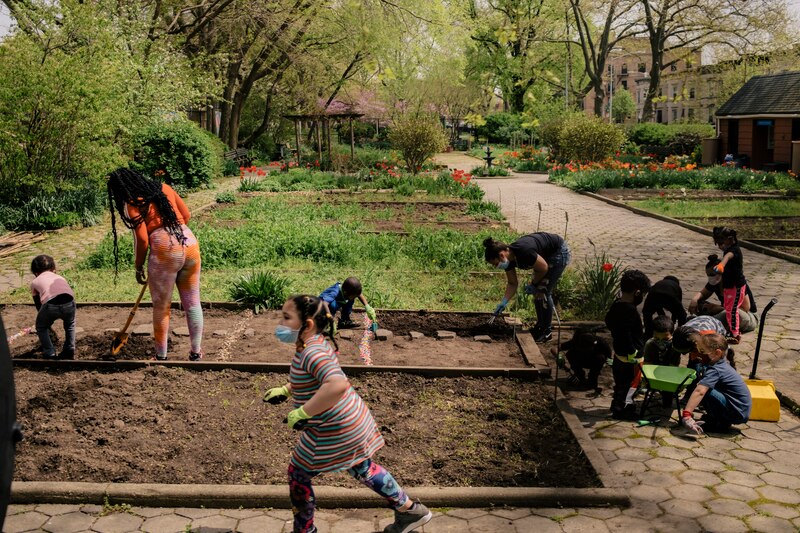
After finding so much community in message threads, P.S. 89 is also trying to lure parents and students back to campus with a weekly meetup for parents to garden together. About half of the students have returned for in-person learning.
It’s clear that schools like P.S. 89 have been changed forever by the coronavirus. One of its lasting impacts, said Principal Irene Leon, will be all the new ways they found to communicate with parents. That includes a new school-wide email address that parents could send questions to, and the WhatsApp group.
“We have a real pulse on where everyone is,” Leon said. “A lot of what we learned this past year we are going to continue moving forward.”
Alex Zimmerman and Amy Zimmer contributed reporting.
Chalkbeat produced this Pandemic 360 series in partnership with Univision 41.

